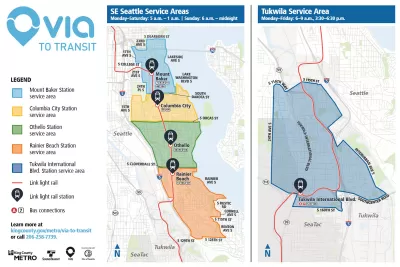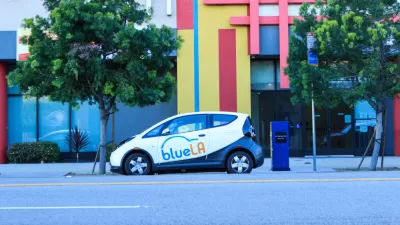An initial lack of success of transportation pilot projects isn't always an indicator of long-term viability in a rapidly shifting transportation landscape, according to this article.

Arielle Fleisher, transportation policy director for SPUR, writes a defense of the pilot project, source of wild ideas.
Unprecedented change in the transportation system, most of it emerging from the private market, has caught the public sector flatfooted. In response, many cities and transit agencies are starting to pilot new kinds of services, testing a variety of ideas for giving people better ways to get around. In a number of cases, the early ridership results from these pilot programs are not strong, which has led many to dismiss the new ideas — and the agencies for trying them.
But this skepticism undermines the intended purpose of pilots: to test and refine the opportunity to extend the transportation system and get people out of their cars. Rather than looking down on pilots, we should embrace experimentation as a chance to learn and to improve transportation outcomes.
With L.A. Metro's on-demand transportation pilot, Via, as an example, Fleisher suggests a few ways pilot projects can be improved to ensure better results, and the transportation solution needed in communities.
FULL STORY: Don’t Dismiss Transportation Pilot Projects: We Need More Wild Ideas

Planetizen Federal Action Tracker
A weekly monitor of how Trump’s orders and actions are impacting planners and planning in America.

Congressman Proposes Bill to Rename DC Metro “Trump Train”
The Make Autorail Great Again Act would withhold federal funding to the system until the Washington Metropolitan Area Transit Authority (WMATA), rebrands as the Washington Metropolitan Authority for Greater Access (WMAGA).

DARTSpace Platform Streamlines Dallas TOD Application Process
The Dallas transit agency hopes a shorter permitting timeline will boost transit-oriented development around rail stations.

LA County Creating Action Plan to Tackle Extreme Heat
Los Angeles County is creating a Heat Action Plan to help communities stay safe during extreme heat, with steps like adding more shade, improving buildings, and supporting the neighborhoods most at risk.

Maryland Plans Quick-Build Complete Streets Projects
The state will use low-cost interventions to improve road safety in five Maryland counties.

Downtown Los Angeles Gears Up for Growth
A new report highlights Downtown L.A.’s ongoing revival through major housing projects, adaptive reuse, hospitality growth, and preparations for global events in the years ahead.
Urban Design for Planners 1: Software Tools
This six-course series explores essential urban design concepts using open source software and equips planners with the tools they need to participate fully in the urban design process.
Planning for Universal Design
Learn the tools for implementing Universal Design in planning regulations.
City of Charlotte
Municipality of Princeton
Roanoke Valley-Alleghany Regional Commission
City of Camden Redevelopment Agency
City of Astoria
Transportation Research & Education Center (TREC) at Portland State University
US High Speed Rail Association
City of Camden Redevelopment Agency
Municipality of Princeton (NJ)





























